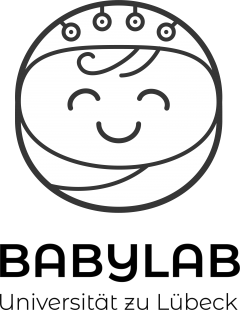What influence does touch have on face perception in 7-month-old babies?
In our current study, we aim to learn more about the influence of maternal touch on emotion and face perception in 7-month-old infants. Our goal is to better understand the role of the sense of touch in processes such as emotion perception and to gain new insights in this area. To do this, we use the method of EEG (electroencephalography), a non-invasive technique in which small sensors, called electrodes, passively record the brain’s electrical activity. This method is well established in infant research and carries no disadvantages. In addition, we will use a pulse oximeter to measure your child’s heart rate. This helps us objectively assess how your child responds to the images, allowing us to make statements regarding their attention and/or arousal. During the measurement, your child will see a presentation of a series of female faces with different facial expressions (happy and fearful) while being stroked by you. As the mother, you will sit next to your child and gently stroke their arm. In a second session of the study, the procedure will remain the same, except that one of our students (another woman) will provide the stroking touch. Your child will not feel anything from the measurement itself and their normal behavior will not be affected.
If you are interested in this project, please feel free to contact us via our Contact Form. We look forward to welcoming you!
How does the influence of the mother’s scent develop over the first year of life?
This project aims to investigate the influence of the mother’s scent on the perception of faces and emotions in babies. For this purpose, we use EEG (electroencephalography) and eye-tracking to record how your baby responds to different faces and to examine the role the mother’s scent plays in this process.

For the first session, we are looking for families with 4-month-old babies. The appointment lasts about 90 minutes and takes place at our facilities on the University of Lübeck campus (CBBM building). During the session, your baby will sit safely and comfortably in an infant seat and look at faces on a screen, with plenty of breaks and opportunities to play, of course. There will be two further sessions when your baby is 7 and 11 months old. This way, we can better understand how perception develops over time.
If you are interested, please feel free to contact us via our Contact Form. We will then call you back to discuss all further details!
How do children perceive action?
Using EEG (electroencephalography), we investigate how children between the ages of 4 and 6 perceive complex, familiar actions. This includes actions such as preparing an apple spritzer. In this example, it is necessary to mix water and juice, which requires first opening the water bottle before pouring the water into the glass. This illustrates that the individual action steps are dependent on one another. In the study, we show videos of action sequences presented either in the correct chronological order or in the wrong order. Our aim is to examine how children respond to the presentation of incorrect action sequences compared to action sequences carried out in the correct order.

The aim of the study is to investigate the processing of complex structures in action perception during early childhood development. We are therefore looking for families with children aged between 4 and 6 years who would like to visit our lab on the University of Lübeck campus.
The appointment lasts about one hour in total, and we measure EEG while your child sits in front of a computer screen on which the videos of the action sequences are shown. The parents remain in the room the entire time and usually sit about one meter behind their child.
If you are interested, please feel free to contact us via our Contact Form, we will call you back!
Past studies
How do babies perceive faces? (finished)
In this study, we want to further investigate how babies perceive faces, which facial features play a role, and what happens in the babies’ brains during this process. We are therefore looking for families with babies aged 7 monthswho would like to come to our lab on the University of Lübeck campus for an EEG study. The appointment lasts about one hour, and we measure EEGwhile the babies sit on their parents’ laps and look at faces on a computer screen.
